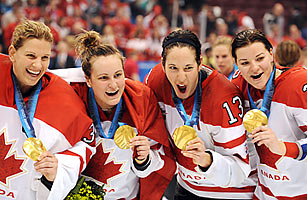
Members of the Canadian women's ice hockey team show off their gold medals at the Vancouver 2010 Olympics
The final seconds ticked down, and the arena was set to break the sound barrier. Canada's women's hockey team, up 2-0 vs. the U.S., was on the verge of winning its third straight Olympic gold medal, one that would shine even brighter since it would be delivered before a delirious home crowd. As the horn sounded at Canada Hockey Place, the team charged goaltender Shannon Szabados, who pitched a brilliant shutout against the States. Her left glove should be enshrined in some Hall of Fame: it stopped shot after American shot and never really gave the Yanks a chance.
The victors dropped their sticks, tossed their helmets and formed a primal pileup near the net. "I think I was one of the last ones [on the pile]," says Canadian forward Caroline Ouellette. "So I probably hurt the ones underneath, 'cause I'm quite heavy." She laughs and continues. "The adrenaline is pumping, and you're so proud, I'm sure no one felt anything."
The Canadian celebration was a flood of raw emotion, the kind of giddy victory party the Olympics are all about. But will women's hockey see many more of these joyous moments down the road? The problem facing the sport is simple. Right now, it's essentially only a North American game. Combined, the U.S. and Canada outscored their opponents by a ludicrous 88-4 composite score in the tournament. A few of the preliminary-round results looked like football scores. Canada beat Slovakia 18-0; the U.S. walloped Russia 13-0. "There were people laughing in the stands," says Jessica Mendoza, a former U.S. Olympic softball player who watched the Feb. 16 U.S.-Russia game.
On the same morning that the two archrivals faced off for the gold medal, IOC president Jacques Rogge put women's hockey on notice. "There is a discrepancy there. Everyone agrees with that," Rogge told reporters on Thursday, Feb. 25, speaking about the talent separation between North America and the rest of the world. (This IOC criticism of hockey is legitimate and credible. Its complaint about Canadian hockey players sipping champagne and smoking stogies on the ice after their win is silly — lighten up, guys.)
Although Rogge noted that women's hockey is still a relatively young sport on the Olympic program — it debuted at the 1998 Games in Nagano — and needs time to grow, he also issued a stern warning. "We cannot continue without improvement," he says.
Given the IOC's treatment of softball, a women's sport dominated by a single power, the U.S., women's hockey should be worried. Softball was cut from the Olympics in 2005 — its final Olympic games were played in Beijing in 2008 — and recently lost a bid to be reinstated for the 2016 Olympics in Rio. IOC members cited a noncompetitive field as the driving factor in its decision. Hockey is safe for the Sochi games in 2014, but if North America wipes everyone out again, the sport's future on the Olympic program will surely be in serious jeopardy.